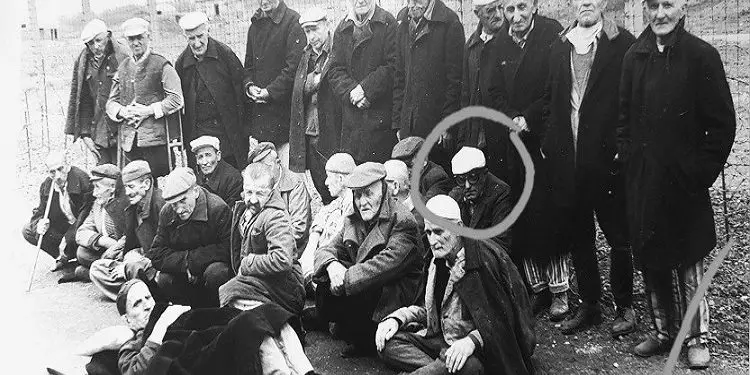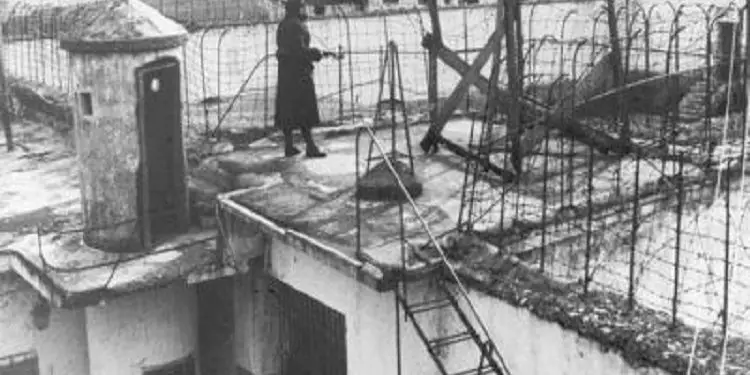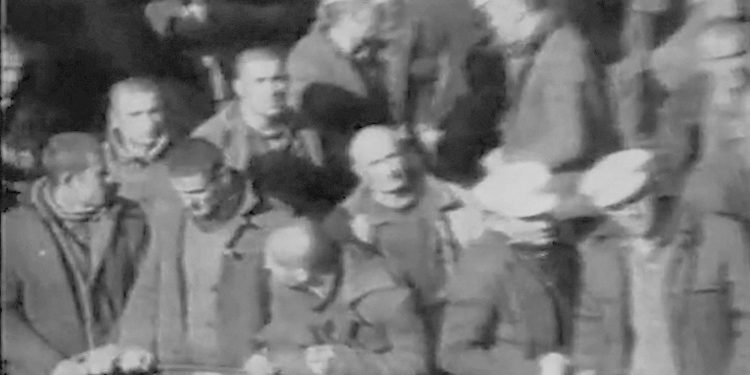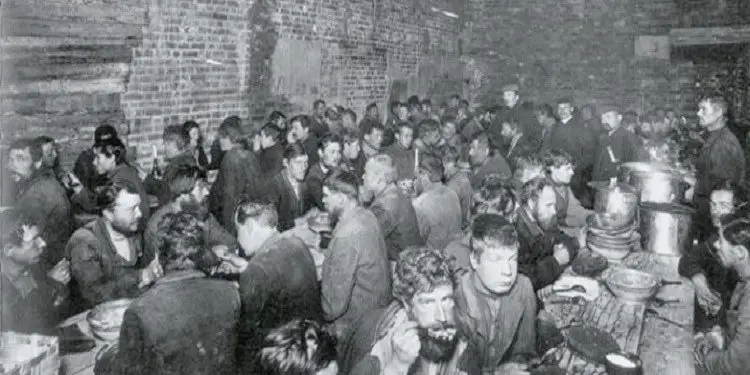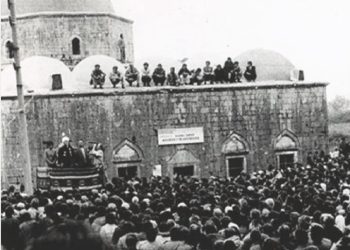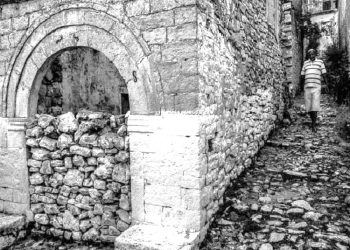By Bep Kuqani
Memorie.al / I have heard that a famous French doctor, a psychiatrist, whose name I cannot remember, said after the collapse of the “Socialist Camp” that: “all those individuals who have suffered over 10 years in prison, under Stalin’s dictatorial regime in the former Soviet Union, and under Enver Hoxha’s dictatorial regime in Albania, cannot be considered normal people”! In this conclusion, he arrived at considering the terrible physical and psychological tortures; the unimaginable sufferings from their treatment as animals, much wilder than former slaves, when they were not regarded as humans but as working animals; the indescribable suffering in forced labor camps from hunger, thirst, freezing, unbearable heat, and exhausting fatigue; where daily human lives were lost.
And this conclusion of the famous Professor was not the result of theoretical studies, but of practical experience because he had the opportunity to visit a considerable number of these individuals who had managed to survive. The two events I will recount below, which happened a long time ago in the Burrel prison, fully corroborate this “prophecy” of the Professor.
The first event: I do not know who had left in custody Musë Halili, from Peshkopia, with a 7-year education, the book “ETHICS” by Benedict Spinoza, which he kept fanatically as a holy book, saying; “I have a trust, and when I get out alive, I must hand it over to the person,” which he had noted somewhere in one of the middle pages of the book, hidden under the cover of a book by Frederick Engels: “The Origin of the Family, Private Property, and the State,” and he had tied it with two or three bundles, at the beginning, in the middle, and at the end of the book, which was almost the same format as Spinoza’s “Ethics.”
The book was an original edition in Latin. (Spinoza wrote all his works in Latin, as was the tradition of those times). But the problem was that only two or three intellectuals knew that language, along with the few remaining Catholic clergy still in prison. From “Ethics”, we had gained some superficial knowledge from “The Heroes of Thought” by W. Durant, in the Italian translation, and this had increased our curiosity and desire to read the complete work.
Thus, we often begged one another to translate it for us, not into Albanian, as it was very difficult, but into Italian. Unfortunately, even those two or three intellectuals were elderly and had health problems, and did not take on the task of this not-so-easy mission. Even the few remaining Catholic clergy refused to translate it due to the fact that the Vatican had it on the “index.”
Indeed, we had fallen into a dilemma. Our desire was so great that two roommates from room no. 10 began to learn Latin with Ndoc Vata, a former seminarian from the Papal Seminary of Shkodër who had been on the verge of becoming a “priest.” These were; Gjon Mark Ndou and Viktor Luka.
As I recall, the other two intellectuals who knew Latin were Gjergj Kokoshi and Xhevat Korça, who later ended his life with a hunger strike. These were in room no. 7, which was considered the “sick room with various health problems.”
In the end, fortunately, a Catholic priest who was the youngest (he hadn’t yet reached his 50s) agreed to translate it into Italian, on the condition that he remained anonymous, because, among other things, any translation without the authorization of the prison management was punished with three months in a solitary confinement cell, in cement, without sleeping clothes.
Such a punishment also befell Father Pjeter Meshkalla, for a study on “The History of the Catholic Church in Albania,” although this was requested by the authorities of the Ministry of Internal Affairs; simply because he wrote it in a completely realistic, anti-atheistic, and anti-communist spirit, but they kept him for only two months; one month was forgiven.
But now, that about 57 years have passed since that time and nearly as long since the “index” was lifted by the Vatican, I believe that today it is not a sin to mention his name, but on the contrary, it is a fully deserved homage, paid with the greatest honor to the eternal memory of his name: This was Dom Lazer Jubani, who also spent five years in internment after prison, and again the agents of State Security did not leave him alone but shortened his life by poisoning him treacherously.
Dom Lazer Jubani was the brother of Dom Simon Jubani, another major figure of the Albanian anti-communist dissidence, well-known not only throughout Albania but also in the entire Albanian diaspora, wherever they were located.
Dom Lazri was endowed by nature with extraordinary intelligence. He had a classical culture of the highest levels. He was a true scholar in the fields of History and Philosophy. He mastered Latin and Ancient Greek thoroughly, in addition to Italian, French, Spanish, and Esperanto.
In prison, he learned Russian and English within two years, thanks to his rare memory. He was very courageous and unyielding with his enemies (the communists); when he was summoned a few days before completing his sentence to propose a “cooperation,” he immediately responded; “Why, do you expect me to become your lackey?!” This answer was enough to cost him 5 years of internment and poisoning.
Meanwhile, Dom Loro Ndoj escaped internment when he was called for the same proposal, giving a somewhat softer response; “I can never do this, because neither my faith nor my conscience allows me. It would be the greatest sin for me to betray the believers who come to confess to me.” Without any shame and with the greatest audacity, they asked the priests to deconspire the “confessions.”
Spinoza’s “Ethics” was a volume of 300 pages, without a single unnecessary word. Dom Lazri made a perfect translation, as evaluated by all the intellectuals who read it, and he received their highest praises. Since I had a relatively beautiful and clearly readable handwriting, they asked me to write it out cleanly, which I accepted with pleasure because I would have the privilege of being the first reader of this valuable work.
The translation was written in three large Chinese arithmetic notebooks of that time, which were larger in both dimensions than Spinoza’s “Ethics.” By utilizing row by row and square by square, I managed to include it within the 300 pages, even having a few leftover blank pages. After I finished, I handed it to Dom Lazri, who wanted to take a look for any potential mistakes.
After this verification, the three notebooks underwent the “operation” of masking with another brochure by Frederick Engels: “Introduction to the Dialectics of Nature,” whose sections were all bound into various parts of “Ethics,” after the formats were equalized.
(One should know that we bought these Marxist books with the sole purpose of masking scientific, historical, and philosophical works in foreign languages). After all this work was done, “Ethics” was put into circulation. For this purpose, a list was prepared of individuals who had expressed a desire to read it and who would be followed in order of requests.
The limit was 10 days for each reader. On the list was also the name of Prof. Foto Bala, who had completed higher studies in France in Philosophy and had defended as his thesis, precisely Spinoza’s “Ethics.”
Now the event begins: When, after several weeks, it was Prof. Foto’s turn to read; I was observing him closely to see what impression the translation made on him, but I couldn’t watch for long, because before he finished reading the first page—I’ll repeat, just the first page; suddenly he hit his forehead and exclaimed: “Puuuuuuuuu, now I understand Spinoza”!!! (No Comment)
The second event:
I shared my sleeping quarters with Ali Selenica for almost six years until one day he was taken and isolated due to the disease of sarcoidosis, and after spending a month in isolation, that illness took his life, even though it was a completely treatable disease with a little care and medication.
In his place, they brought Suad Asllani, a well-known former lawyer in Tirana, who was arrested along with Gjergj Kokoshi on the charge of attempting to create a social-democratic party of the Scandinavian type, with the founding initiator Musine Kokalari, one of the rare Albanian intellectuals.
Ali Selenica was a short man, so worn out and so suffering that he had become emaciated and looked like a skeleton; if you weighed him, I doubt he would reach 35 kilograms. He had completed his higher studies in Italy in Law and had been the chairman of the Court in Korçë before the communists came to power. During the time we lived together, no one came to visit him, and no one showed any interest in him through letters!
His greatest torment was that he didn’t know anything about the fate of his two sons, with whom he had lost contact about 4-5 years earlier. Several times he had asked the Ministry of Internal Affairs if they had been captured or killed at the border in an attempt to escape, but the response was always negative: “There are no records at any of our border points of any killed or captured individuals with those names.” He also reached out to the Albanian and International Red Cross, but received negative responses from them as well.
It is difficult to imagine the anguish and despair of a 70-year-old man, completely alone in the harsh conditions of a prison like Burrel! Twice a day, we were taken out into the yard for fresh air and a stroll, to ensure that we moved and did not become stiff, but also to keep us in a state capable of work, in case of need.
This time was also used for various needs; someone would cook something quick, someone would wash themselves or wash some clothes, and in general, we would fill water to have inside the room.
Ali Selenica had an Italian army mess tin, weighing two kilograms, which he always kept hanging from one hand. When the time of the call came to an end, the internal guard would blow the whistle, and we had to get inside as quickly as possible into the rooms. Those who delayed risked facing “solitary confinement,” especially when the duty was held by Corporal Asllan Uka, who would not forgive a second.
One day, it happened to be Corporal Asllan who gave only a 5-minute deadline to get inside. As the prisoners were rushing to get inside as quickly as possible, I saw Ali moving around the yard. He would go to the fountain, then to the place where food was cooked, and then to where we washed; I asked him, “Come on, Ali, what’s wrong, what are you looking for?”
“I’m looking for the mess tin, Bep, I don’t know where I left it?” – He had the two-liter mess tin hanging from his hand!
“Come on, Ali, quickly,” I said, “you have the mess tin hanging from your hand!” He slapped his forehead with his finger and ran to get inside! There you go; “Isn’t this what they call complete psychological confusion?!”
And an incredible miracle: Sali Vata from Macukulli in the Mat district had been an officer in King Ahmet Zogu’s Royal Guard, with the rank of captain. Although 77 years old, he maintained the form of a good physique; 1.90 m tall, with broad shoulders and an upright, graceful body.
However, for a year, he had been plagued by rheumatism, so severely that it had crippled him in the back, and he could not straighten his body due to the pain; he remained “bent over,” hunched like a broken person in the middle.
On a day in December, just before the New Year, he felt very unwell and could not get up in the morning when the wake-up whistle blew, which always sounded at 5 o’clock, in every season of the year.
That day happened to be served by the most unkind guard, the criminal and sadist Asllan Uka, who cared nothing for the elderly or the sick! When he came into the room to check if everyone was up, where besides two or three people sick with the flu, who had permission from Corporal Kamber to stay, Sali Vata was there. He lunged at Sali Vata: “But you, why aren’t you up?! Get up quickly, to solitary confinement!”
Two unfortunate people helped Sali get up and dress, and as such, supporting him by the arms, they brought him to solitary confinement, where Corporal Asllani left him for a whole month. And to whom would he complain? Corporal Kamberi had gone on vacation for the holidays! The decisions made by the guards regarding punishments were never discussed or opposed by the prison directorate.
The friends in the room thought almost unanimously that Sali would not come out alive from there; in the cold, on the cement, without sleeping clothes, and with such severe rheumatism…! But the “miracle” happened: After a month, Sali Vata came back to the room, straight as a candle, without pain, completely healed!!! “Well, Sali, how did you get through, how did you heal?” – we asked. And Sali responded:
“How did I get through? How did I heal? Only God knows! Here, let me tell you: When I was taken to solitary confinement, I lost all hope. Now, – I said to myself, – my end has come, and to hasten my end to avoid suffering much in solitary confinement, I lay down on the cement and remained that way the first day, the second day, the third day; waiting for the rheumatism to spread throughout my body, to completely paralyze me and suffocate me.
But surprisingly, after 5-6 days of lying down, I felt my back loosen. Instead of my body locking up, it completely unlocked, even though I remained almost all the time lying down and only got up when I felt very cold. Thus, I healed.” Isn’t this a true “miracle”?! Memorie.al




